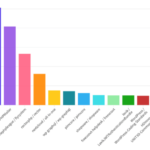
As a PHP developer, you will be responsible for a variety of tasks involved in the development of websites and web applications. Some of the key responsibilities of a PHP developer include:
- Designing and implementing databases
- Developing web applications using PHP
- Testing and debugging code
- Collaborating with team members
- Staying updated with the latest PHP trends and best practices
- Documenting and reporting on project progress
In this article, we will discuss in detail the job tasks involved in PHP development and the different roles a PHP developer can play in a development team. We’ll also explore the importance of effective communication and continuous learning in achieving project success.
Roles of a PHP Developer
A PHP developer can play various roles in a development team, and the responsibilities can vary depending on the role. The following are some common roles of a PHP developer:
- Backend Developer: In this role, the PHP developer is responsible for creating and maintaining server-side logic that powers web applications. They develop APIs for web and mobile applications, create database architectures, and write complex queries to retrieve and store data.
- Full Stack Developer: A full stack developer is responsible for both frontend and backend development. They work on the server-side and client-side to ensure the seamless functioning of web applications.
- Lead Developer: A lead PHP developer is responsible for managing the team, delegating tasks, and ensuring that the project is on track. They must possess excellent communication and leadership skills.
- Technical Architect: In this role, the PHP developer is responsible for designing and implementing the technical architecture of web applications. They work with the team to identify technical requirements and provide a roadmap for development.
- Freelance Developer: A freelance PHP developer works on a project-by-project basis. They are responsible for managing their workload, meeting deadlines, and communicating with clients.
Responsibilities Specific to Each Role:
Regardless of the role, a PHP developer is responsible for writing clean, efficient, and scalable code that meets project requirements. They must also stay up-to-date with the latest PHP trends and best practices and collaborate effectively with team members.
Developing Web Applications
Developing web applications is one of the key tasks of a PHP developer. In order to successfully build web applications, a PHP developer must possess a solid understanding of web development concepts and technologies, including HTML, CSS, JavaScript, and MySQL. They must be able to write clean, efficient, and maintainable code that adheres to industry best practices and standards.
In addition to technical skills, a PHP developer must also have strong problem-solving skills and the ability to work collaboratively with designers, project managers, and other developers. They must be able to translate business requirements into functional and technical requirements and implement them in the web application.
| Skills and Knowledge Required for Developing Web Applications |
|---|
| PHP – A proficient understanding of PHP is a must-have skill for a PHP developer. They must be able to write secure and efficient code using PHP frameworks such as Laravel, CodeIgniter, and Yii. |
| HTML, CSS, and JavaScript – A solid understanding of HTML, CSS, and JavaScript is essential for developing web applications. A PHP developer must be able to create responsive and visually appealing web pages using these technologies. |
| MySQL – MySQL is one of the most popular database management systems used to store and retrieve data. A PHP developer must be able to design and implement database structures and write SQL queries to interact with the database. |
| Version Control Systems – A PHP developer must be familiar with version control systems such as Git to manage the codebase and collaborate with other team members effectively. |
Developing web applications requires a wide range of skills and knowledge, and a PHP developer must continuously learn and stay updated with the latest technologies and trends to be successful in their job.
Designing and Implementing Databases
A crucial responsibility of a PHP developer is designing and implementing databases. In PHP development, a database is used to store and organise large amounts of data in an efficient manner. A PHP developer must possess the necessary skills and knowledge to design, create, and maintain databases to ensure that the data is organised accurately and efficiently.
Database management skills are vital to a PHP developer’s role. They must be familiar with database systems such as MySQL, Oracle, or SQL Server, and be able to write complex SQL queries to retrieve, modify, and delete data from the database. It is also important that they understand the principles of data normalisation, which is critical for maintaining the accuracy and integrity of the data.
Moreover, a PHP developer must be able to work with other team members to ensure that the database design meets the project requirements. They should collaborate with the project manager and the client to understand the business needs and design the database schema accordingly. Additionally, a PHP developer should be able to troubleshoot any issues related to the database performance and recommend solutions to improve it.
Testing and Debugging
Testing and debugging are essential tasks for any PHP developer. As such, it is essential to understand the importance of these tasks and the processes involved in ensuring the quality of the code.
PHP developers must test their code to ensure it functions as intended. This process involves running the code through a series of tests to identify any errors or bugs. Once identified, the developer must correct the errors and perform further tests to ensure they have been fixed correctly.
Debugging involves identifying and fixing errors in the code. This task requires a thorough understanding of the PHP language, as well as the ability to troubleshoot complex problems. A skilled PHP developer can quickly identify and resolve issues to ensure code quality.
Testing and debugging go hand in hand, and PHP developers must excel at both tasks. They must have the ability to identify issues quickly and work collaboratively with team members to resolve them.
Collaborating with Team Members
PHP development projects are rarely undertaken by a single developer; they require a team effort. Collaboration and communication among team members are essential to ensure the successful completion of a project. As a PHP developer, it’s your responsibility to work effectively with your teammates.
One way to foster collaboration is by adopting a team-oriented approach. This means taking the time to understand and appreciate the unique contributions that each team member brings to the project. By recognizing and valuing these differences, you can encourage an atmosphere of mutual respect and cooperation.
Effective communication is also crucial in collaboration. Clear and concise communication ensures that everyone on the team is on the same page regarding project requirements, deadlines, and milestones. It also ensures that any issues or concerns are addressed promptly and effectively.
Collaboration Techniques for PHP Development Projects
To facilitate communication and collaboration, consider using the following techniques:
- Regular team meetings to discuss project status, updates, and progress
- Shared online tools and platforms for collaborating and sharing information, such as project management software, instant messaging apps, and file-sharing platforms
- Agile development methodologies, such as Scrum or Kanban, that emphasize collaboration and teamwork
- Peer review and code reviews to ensure that all team members are familiar with project code and can provide feedback
By adopting these techniques, you can ensure that your team is working together effectively towards the common goal of completing the PHP development project successfully.
Stay Updated with PHP Trends and Best Practices
As a PHP developer, it is essential to keep up-to-date with the latest trends and best practices in the industry. With the ever-evolving technology landscape, staying current with new developments and emerging technologies is crucial to ensure the successful development of PHP projects.
Continuous learning and professional development are essential in today’s fast-paced industry. By keeping yourself updated with new trends and best practices, you can enhance your skills and stay relevant in the job market. You can also bring fresh perspectives and innovative ideas to your projects.
One way to stay updated is to participate in online communities and forums where developers share knowledge and expertise. It’s also a good idea to attend industry events and conferences that focus on PHP development. These events provide excellent opportunities to network with other professionals and learn about emerging trends in the PHP ecosystem.
In addition to staying informed on new trends, it’s also important to develop and follow best practices in PHP development. Best practices ensure that your code is clean, efficient, and maintainable. It also helps to prevent errors and bugs that can cause problems down the line.
Stay updated and follow best practices to ensure your PHP development projects are successful.
Documenting and Reporting
Documenting and reporting are crucial tasks for a PHP developer. It’s important to maintain detailed documentation that can be used for future reference and collaboration. Clear and concise documentation ensures that everyone on the team can understand the project’s requirements and technical specifications. This process helps prevent errors and reduces the time it takes to resolve issues that may arise during the development process.
As a PHP developer, you will also need to provide regular reports on the progress of your work. This ensures that everyone on the team is aware of how the project is progressing and what tasks have been completed. Reports can take many forms, from simple spreadsheets to more detailed project management software. Whatever the format, clear reporting helps keep everyone on the same page and provides a roadmap for the rest of the project.
To complete these tasks effectively, you’ll need excellent organizational and communication skills. You’ll be working with a team of developers and other professionals, so being able to communicate ideas and progress effectively is crucial for success. It’s also essential to be adept at using tools like Git, JIRA, and other project management software.
Conclusion
The duties and responsibilities of a PHP developer are crucial in ensuring the success of PHP development projects. From developing web applications and designing databases to testing and debugging code, PHP developers play a critical role in creating functional and efficient software. Effective collaboration with team members and staying updated with industry trends and best practices are equally important.
It is also essential for PHP developers to maintain thorough documentation and reporting for future reference and collaboration. As the demand for skilled developers continues to grow, it is crucial for PHP developers to continuously learn and develop their skills to remain competitive in the job market.
In conclusion, a skilled PHP coder has a significant role in shaping the digital world we live in today. Their responsibilities in PHP development are extensive and require a high level of knowledge, expertise, and attention to detail, but the rewards of creating functional and efficient software are worth the effort.
FAQs
1. What are the primary duties of a PHP Developer?
PHP Developer Responsibilities often include writing server-side web application logic, developing back-end components, and integrating user-facing elements.
2. How do PHP Developers collaborate with other team members?
A PHP Developer actively collaborates with front-end developers to integrate user interfaces and ensures seamless functionality across web applications.
3. Are PHP Developers responsible for database management?
Yes, PHP Developer Responsibilities often encompass database management, where they create, modify, and optimize databases to ensure efficient data retrieval.
4. Do PHP Developers play a role in testing and debugging?
Absolutely! A crucial part of PHP Developer Responsibilities is to test and debug applications, ensuring that they run smoothly and are free of errors.
5. How do PHP Developers stay updated with the latest technologies?
PHP Developers proactively engage in continuous learning, attend workshops, and follow industry trends to stay updated with evolving technologies and best practices.
Ashley is an esteemed technical author specializing in scientific computer science. With a distinguished background as a developer and team manager at Deloit and Cognizant Group, they have showcased exceptional leadership skills and technical expertise in delivering successful projects.
As a technical author, Ashley remains committed to staying at the forefront of emerging technologies and driving innovation in scientific computer science. Their expertise in PHP web development, coupled with their experience as a developer and team manager, positions them as a valuable resource for professionals seeking guidance and best practices. With each publication, Ashley strives to empower readers, inspire creativity, and propel the field of scientific computer science forward.



![How to use Cursor AI to write PHP Code[Example]](https://hirephpdeveloper.dev/wp-content/uploads/2025/03/How-to-use-Cursor-AI-to-write-PHP-Code-1-150x150.png)



